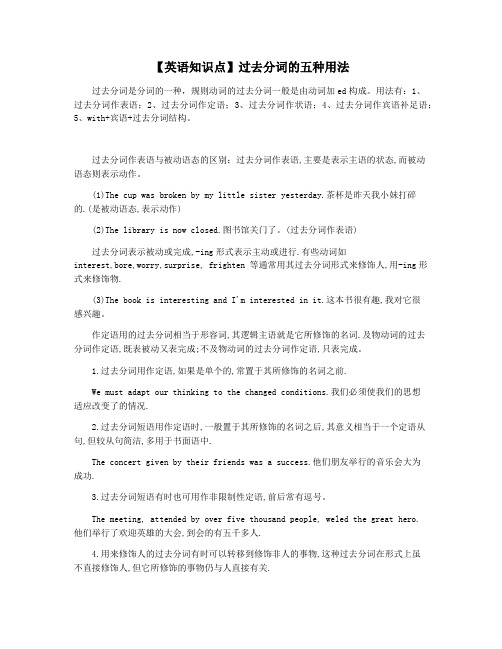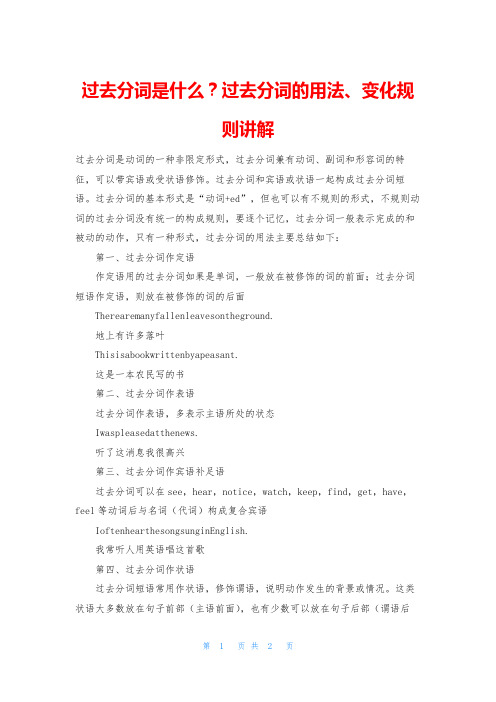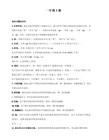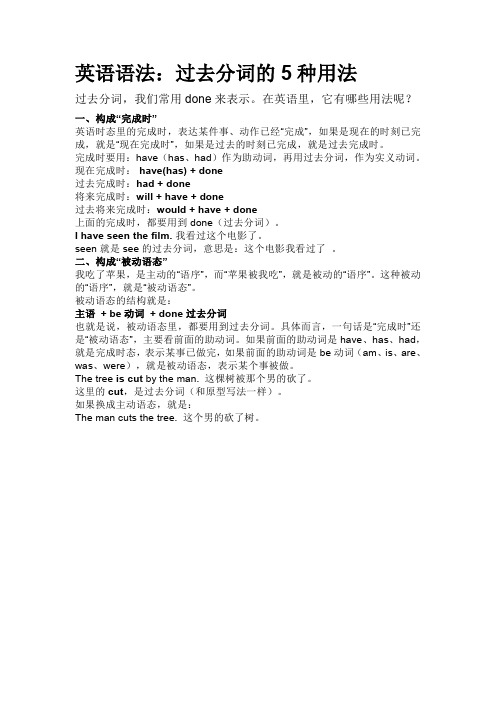过去分词的用法
【英语知识点】过去分词的五种用法

【英语知识点】过去分词的五种用法过去分词是分词的一种,规则动词的过去分词一般是由动词加ed构成。
用法有:1、过去分词作表语;2、过去分词作定语;3、过去分词作状语;4、过去分词作宾语补足语;5、with+宾语+过去分词结构。
过去分词作表语与被动语态的区别:过去分词作表语,主要是表示主语的状态,而被动语态则表示动作。
(1)The cup was broken by my little sister yesterday.茶杯是昨天我小妹打碎的.(是被动语态,表示动作)(2)The library is now closed.图书馆关门了。
(过去分词作表语)过去分词表示被动或完成,-ing形式表示主动或进行.有些动词如interest,bore,worry,surprise, frighten 等通常用其过去分词形式来修饰人,用-ing形式来修饰物.(3)The book is interesting and I'm interested in it.这本书很有趣,我对它很感兴趣。
作定语用的过去分词相当于形容词,其逻辑主语就是它所修饰的名词.及物动词的过去分词作定语,既表被动又表完成;不及物动词的过去分词作定语,只表完成。
1.过去分词用作定语,如果是单个的,常置于其所修饰的名词之前.We must adapt our thinking to the changed conditions.我们必须使我们的思想适应改变了的情况.2.过去分词短语用作定语时,一般置于其所修饰的名词之后,其意义相当于一个定语从句,但较从句简洁,多用于书面语中.The concert given by their friends was a success.他们朋友举行的音乐会大为成功.3.过去分词短语有时也可用作非限制性定语,前后常有逗号。
The meeting, attended by over five thousand people, weled the great hero.他们举行了欢迎英雄的大会,到会的有五千多人.4.用来修饰人的过去分词有时可以转移到修饰非人的事物,这种过去分词在形式上虽不直接修饰人,但它所修饰的事物仍与人直接有关.The boy looked up with a pleased expression.男孩带着满意的表情举目而视。
过去分词特殊用法大全

过去分词特殊用法大全1. 作为补足语,补充说明主语的状态过去分词也可以作为补足语,补充说明主语的状态或所经历的动作。
这种用法常用于描述主语所处的特定状态或经历的特定事件。
例如:The building, destroyed in the war, has now been rebuilt.(这座在战争中被毁的大楼现在已经重建完成。
)2. 作为定语,修饰名词过去分词也可以作为定语,修饰名词。
这种用法通常表示该名词的特征或状态。
例如:The developed country has advanced technology.(发达国家拥有先进的技术。
)3. 作为状语,表示被动或完成动作过去分词与主句中的主语形成逻辑上的被动关系,有时也表示动作已完成且与主句中的主语形成逻辑上的被动关系。
这种用法下,过去分词可以放在句首或句末,通常用来描述动作的结果或背景。
例如:Seen from the top of the mountain, the city looks like a small village.(从山顶看,这座城市就像一个小村庄。
)Seen in the dark night, lights on top of tall buildings look like stars in the sky. (seen表示被动,分词的动作与谓语动词的动作同时发生)。
4 用于“get+过去分词”的被动语态除了“be+过去分词”的被动语态外,有时也会使用“get+过去分词”的形式。
这种结构表示一种较为口语化、非正式的被动语态。
例如:The company got founded in 2000.(这家公司成立于2000年。
)5 用于“have+过去分词”的结构“have+过去分词”是一种常见的结构,表示使役意义。
这种结构中的have可以解释为“让”、“使”等意义,后面接过去分词表示动作的完成。
例如:I had my computer repaired this morning.(今天早上我找人修了电脑。
过去分词是什么?过去分词的用法、变化规则讲解

过去分词是什么?过去分词的用法、变化规则讲解过去分词是动词的一种非限定形式,过去分词兼有动词、副词和形容词的特征,可以带宾语或受状语修饰。
过去分词和宾语或状语一起构成过去分词短语。
过去分词的基本形式是“动词+ed”,但也可以有不规则的形式,不规则动词的过去分词没有统一的构成规则,要逐个记忆,过去分词一般表示完成的和被动的动作,只有一种形式,过去分词的用法主要总结如下:第一、过去分词作定语作定语用的过去分词如果是单词,一般放在被修饰的词的前面;过去分词短语作定语,则放在被修饰的词的后面Therearemanyfallenleavesontheground.地上有许多落叶Thisisabookwrittenbyapeasant.这是一本农民写的书第二、过去分词作表语过去分词作表语,多表示主语所处的状态Iwaspleasedatthenews.听了这消息我很高兴第三、过去分词作宾语补足语过去分词可以在see,hear,notice,watch,keep,find,get,have,feel等动词后与名词(代词)构成复合宾语IoftenhearthesongsunginEnglish.我常听人用英语唱这首歌第四、过去分词作状语过去分词短语常用作状语,修饰谓语,说明动作发生的背景或情况。
这类状语大多数放在句子前部(主语前面),也有少数可以放在句子后部(谓语后面),或者插在中间(主语后面)Theprofessorcamein,followedbyagroupofyoungpeople.教授走进来,后面跟着一群年轻人1、表原因,相当于一个原因状语从句Thechildrensoonfeelasleep,exhaustedbythejourney.由于旅途劳累,孩子们很快就睡着了2、表时间,相当于一个时间状语从句Seenfromthehill,theparklooksverybeautiful.从山上看这个公园非常漂亮3、假设的情况,相当于一个条件状语从句Givenmoretime,wecoulddoitmuchbetter.多给点时间,我们会做得更好些4、表让步,相当于一个让步状语从句Beatenbytheoppositeteam,theplayerswerenotdiscouragedandpractisedevenharder.虽然被对方打败,但队员们没有泄气,更加刻苦训练5、表伴随情况,这种用法没有与之相当的状语从句可以代替Hecameback,utterlyexhausted.他回来时,疲惫不堪相关推荐过去分词是动词的一种非限定形式,过去分词兼有动词、副词和形容词的特征,可以带宾语或受状语修饰。
过去分词的用法有哪些

=We must keep a secret of the things which are being discussed here.
我们必须对这里讨论的问题保密。
(2)如指未来的情况,都用不定式的被动形式。
=If all things are considered, her paper is of greater value than yours.
3.He lay in bed with his head covered.(方式状语)
他躺在床上,盖着头。
4.He lay on his back, his teeth set, his right hand clenched on his breast and his glaring eyes looking straight upward.
(1)The books dealing with the Long March are sold out.
=The books which deal with the Long March are sold out.
有关长征的书售完了。
(2)The books written by Guo Jinming are popular with young people.
=The books which were written by Guo Jinming…
郭敬民写的书很受年青人的欢迎。
例5.No computer so far ______ can have the same ability as human rights.
英语语法:过去分词的5种用法

英语语法:过去分词的5种用法
过去分词,我们常用done来表示。
在英语里,它有哪些用法呢?
一、构成“完成时”
英语时态里的完成时,表达某件事、动作已经“完成”,如果是现在的时刻已完成,就是“现在完成时”,如果是过去的时刻已完成,就是过去完成时。
完成时要用:have(has、had)作为助动词,再用过去分词,作为实义动词。
现在完成时:have(has) + done
过去完成时:had + done
将来完成时:will + have + done
过去将来完成时:would + have + done
上面的完成时,都要用到done(过去分词)。
I have seen the film.我看过这个电影了。
seen就是see的过去分词,意思是:这个电影我看过了。
二、构成“被动语态”
我吃了苹果,是主动的“语序”,而“苹果被我吃”,就是被动的“语序”。
这种被动的“语序”,就是“被动语态”。
被动语态的结构就是:
主语+ be动词+ done过去分词
也就是说,被动语态里,都要用到过去分词。
具体而言,一句话是“完成时”还是“被动语态”,主要看前面的助动词。
如果前面的助动词是have、has、had,就是完成时态,表示某事已做完,如果前面的助动词是be动词(am、is、are、was、were),就是被动语态,表示某个事被做。
The tree is cut by the man. 这棵树被那个男的砍了。
这里的cut,是过去分词(和原型写法一样)。
如果换成主动语态,就是:
The man cuts the tree. 这个男的砍了树。
英语中动词过去分词用法

英语中动词过去分词用法在英语学习中,动词过去分词的用法是一个重要的知识点。
掌握它对于正确理解和运用英语语言至关重要。
接下来,让我们一起深入探讨一下动词过去分词的各种用法。
动词过去分词在英语中主要有以下几种常见用法:一、构成完成时态完成时态包括现在完成时和过去完成时。
现在完成时的构成是“have/has +过去分词”,表示过去发生的动作对现在造成的影响或结果,或者从过去某一时间开始一直持续到现在的动作或状态。
例如:“I have finished my homework”(我已经完成了我的作业。
)这里“finished”就是“finish”的过去分词。
过去完成时的构成是“had +过去分词”,表示在过去某个时间或动作之前已经发生的动作或存在的状态。
比如:“By the time I arrived, they had left”(我到达的时候,他们已经离开了。
)二、构成被动语态被动语态的构成是“be +过去分词”。
当我们想要强调动作的承受者,而不是执行者时,就会使用被动语态。
例如:“The window was broken by the boy”(窗户被那个男孩打破了。
)在这个句子中,“broken”是“break”的过去分词,“was broken”表示窗户是被打破的。
三、作定语过去分词可以作定语,修饰名词或代词。
如果是单个的过去分词作定语,通常放在被修饰词的前面;如果是过去分词短语作定语,则要放在被修饰词的后面。
例如:“a broken cup”(一个破杯子),“The book written by Lu Xun is very popular”(鲁迅写的那本书很受欢迎。
)在第一个例子中,“broken”在名词“cup”前面作定语;在第二个例子中,“written by Lu Xun”是过去分词短语,在名词“book”后面作定语。
四、作状语过去分词可以作状语,表示时间、原因、条件、伴随等。
过去分词 应用文写作

过去分词应用文写作
过去分词在应用文写作中可以用来表达一种被动语态,描述某个事件或状态已经完成或已经发生。
在应用文中,过去分词的使用可以使文章更加简洁明了,同时也能更好地突出重点。
以下是一些过去分词在应用文写作中的常见用法:
1. 表达已经完成的事情:例如,“The report has been completed”(报告已经完成)。
2. 描述状态或条件:例如,“The equipment is being tested”(设备正在进行测试)。
3. 表达时间顺序:例如,“After the meeting, the documents were distributed”(会议结束后,文件被分发了)。
4. 强调结果或影响:例如,“The project was cancelled due to insufficient funding”(由于资金不足,该项目被取消了)。
总之,过去分词在应用文写作中能够让语言更加流畅、准确,同时也能更好地表达意思。
在写作时,要注意正确使用过去分词的时态和语态,以避免产生歧义或误解。
过去分词的用法讲解

过去分词的用法讲解过去分词的用法在英语语法中很是普遍。
那么,如何正确的使用过去分词呢?我们来看看过去分词的用法解析,只有了解了过去分词的用法,才能正确的运用和使用它。
一、基本概念1.分词的定义动词的-ed分词即过去分词,是由动词的过去分词构成,一般只有一种形式。
2.过去分词的语法作用:过去分词一方面具有动词的性质,另一方面也相当于一个形容词或副词,在句中可以作表语、定语、状语和补足语。
1)过去分词作表语,主要表示主语的心理感觉或所处的状态。
如:Don' t touch ihe glass because it is broken.不要碰那个杯子,它是坏的。
He is quite pleased with the design of the dress.她很喜欢那礼服的式样。
2)过去分词做定语:单个的过去分词作定语一般放在名词的前面,相当于一个定语从句。
如:The excited people rushed into the building.激动的人们奔进了大楼°We need more qual ified teachers.我们需要更多合格的教师。
过去分词短语作定语通常放在被修饰的词后面,相当于一个定语从句。
如:Is there anything planned for tomorrow?明天有什么活动吗?The suggestion made by the foreign expert was adopted by the manager.夕卜国专家提出来的建议被经理采纳了。
过去分词作定语也可用作非限制性定语,前后用逗号隔开。
如:The books, written by Lu Xun, are popular with many Chinese people.这些书是鲁迅写的,受到了许多中国人民的喜爱。
The meeting, attended by one thousand students, was a success.这次会议获得很大的成功,共有一千个学生出席了。
- 1、下载文档前请自行甄别文档内容的完整性,平台不提供额外的编辑、内容补充、找答案等附加服务。
- 2、"仅部分预览"的文档,不可在线预览部分如存在完整性等问题,可反馈申请退款(可完整预览的文档不适用该条件!)。
- 3、如文档侵犯您的权益,请联系客服反馈,我们会尽快为您处理(人工客服工作时间:9:00-18:30)。
过去分词的用法过去分词的用法1. 过去分词作表语She is interested in the interesting book.2. 过去分词作定语1)过去分词作定语既可以放在所修饰的词之前,作前置定语,也可以放在所修饰的词后面,作后置定语。
其作用相当于一个定语从句。
例如:Where are the reserved seats? (=Where are the seats which have been reserved?)预定的座位在哪里?区别:This is a pressing problem. (=This is a problem which is pressing.)这是一个紧迫的问题。
2)过去分词作后置定语可分为限制性(紧跟在所修饰的中心词之后)和非限制性(用逗号与其所修饰的中心词分开)两种,其作用分别相当于一个限制性定语从句和非限制性定语从句。
例如:The funds raised (= which have been raised)are mainly used for helping the homeless.筹集的资金主要用来帮助那些无家可归的人。
区别:There are many students waiting (= who are waiting)to get examined. 有许多学生在等待检查。
This book,written (= which is written)in simple English,is suitable for beginners.本书是用浅显的英语写的,适合初学者。
3)过去分词常和形容词、副词或名词构成合成形容词作定语。
例如:The newly-built building is our office building.这座新建的大楼是我们的办公楼。
区别:The flower-carrying girl must be waiting for someone.那位手持鲜花的姑娘一定在等人。
4)有些不及物动词的过去过去分词作定语,并不表示被动而是表示完成。
常作前置修饰语。
例如:There are a lot of fallen leaves in autumn.秋天有许多落叶。
The film describes the story about the police who pursue an escaped man.这部电影描述的是警察抓逃犯的事。
常用的这一类词有:fallen,faded,returned,retired,risen,grown up,vanished等。
3. 过去分词作宾语补足语1)跟过去分词作宾补的动词有:catch,have get,keep,hear,find,feel,leave,make,want,start,notice,observe,watch,set等。
例如:When they returned home from the holiday,they found their house stolen.We want this work finished quickly.我们要求这项工作很快完成。
2)在复合宾语中,用现在过去分词作宾补,说明宾语是动作的发出者,形成逻辑上的主谓关系;用过去过去分词作宾补,表示宾语是动作的承受者,构成逻辑上的动宾关系。
例如:There was so much noise that the speaker couldn't make himself heard.由于十分吵闹,讲话人没法让人听到他的声音。
When he awoke,he found himself being looked after by an old woman.他醒来的时候发现一位老大娘正在照顾他。
4. 过去分词作状语1)过去分词或过去分词短语作状语时,可以表示时间、原因、让步、条件、方式或伴随状况。
通常可转换成相应的状语从句;表示方式或伴随状况的可以转换成并列句或非限制性定语从句。
例如:Confined to bed (= Because she was confined to bed),she needed to be waited on in everything.她卧病在床,什么事都需要人伺候。
(作原因状语)区别:Having only book knowledge (= If you only have book knowledge),you will not be able to work well.如果只有书本知识,你就不可能做好工作。
(作条件状语)They stood there,waiting for the bus. (=They stood there and waited for the bus.)(作伴随状语)2)现在分词和过去分词作状语时的用法比较不管是现在过去分词还是过去过去分词作状语,如果单独作状语,其逻辑主语必须和主句的主语一致。
过去分词作状语通常可以转换成一个相应的状语从句,如果状语从句中的谓语动词为被动结构,就用过去过去分词;如果状语从句中的谓语动词为主动结构,就用现在过去分词。
有时为了强调,过去分词前可带连词when,while,if,though,as if,unless等一起作状语,以便使句子的意思更清楚、更连贯。
例如:Defeated (= Though he was defeated),he remained a popular boxer.虽然他被击败了,但他仍然是一个受人喜爱的拳击手。
区别:Working hard (If you work hard),you will succeed.如果你努力,你会成功的。
5. 过去分词的独立结构1)过去分词作状语时,要特别注意其逻辑主语必须和谓语动词的主语一致。
否则,过去分词必须有自己的主语,这种带主语的过去分词被称为过去分词的独立主格结构。
在句中作状语,表示时间、原因、条件等。
例如:The project finished,they had a two weeks' leave.完成那个计划后,他们休了两周假。
He being absent,nothing could be done.由于他缺席,什么事也没法干。
2)独立结构有时也可以用“with/ without + 名词(或代词的宾语)+ 过去分词”的结构,表示伴随状况。
例如:They sat there silently,(with)their eyes fixedon the lake.他们静静地坐在那里,眼睛看着湖面。
区别:With him helping me,I felt lucky.有他的帮助,我感到很幸运。
温馨提示:非谓语动词解题三大步骤:辨别“谓语与非谓语”;找逻辑主语;分析时态语态一、选择1. The problem just ___is an important one.A.to be referred to B.referred to C.referring to D.referred2.The water in this glass is too hot.I prefer some cold ___water.A.to boil B.having boiled C.boiled D.boiling3.The story was so ___that all of us were ___to tears.A.moving; moving B.moved; moved C.moved; moving D.moving; moved4.She was very glad to see her child well ___.A.take care of B.taken care of C.to take care of D.taking care of5. He had his leg ___in the football match yesterday.A.to break B.broken C.break D.breaking6.With the job___, they went to the cinema.A.doing B.do C.to do D.done7.With the boy ___the way, the soldiers managed to walk through the forest.A.to lead B.led C.leading D.to be leading8. The captain placed the flag over the boy, only his face uncovered.A.left B.be left C.to be left D.leaving9.______many times, but he still couldn't understand it .______many times, he still couldn't understand it .A. Having been toldB. Being toldC. He had been toldD. Though he was told10. __ a hot day, we’d better go swimming.__ _ a hot day. W e’d better go swimming.A、being B. to be C. It was D. It being二、填空1. He told me about the things ___(discuss)at the meeting.2.I found my daughter quite ___(interest)in drawing.3. (enter)the theatre, I saw him seated in the first row.4.I still remember _______ (take) to the Famen Temple and what I saw there.5._________ (bring) up by his grandparents, Jimmy wasn't used to living with his parents.6.He is very popular among his students as he always tries to make them ________ (feel) easy in his classes. 7.I like getting up very early in summer.The morning air is so good ___________ (breathe).8.He was busy writing a story, only ___________ (stop) once in a while to smoke a cigarette.9.Every evening after dinner, if not __________ (tire) from work, I will spend some time walking my dog. 10.We all look forward to _________ (hear) from you soon.Don't keep us __________ (wait) for long.三、同义句转换1.(1)________________ (turn) to the left, and you'll see the bus stop.(2)________________ (turn) to the left, you'll see the bus stop.2.(1)As he ________________ (be) an engineer, he knew how torun the machine.(2)________________ (be) an engineer, he knew how to run the machine.3.(1)Weather ________________ (permit), we'll go and pay a visit to your school.(2)If weather ________________ (permit), we'll go and pay a visit to your school.4.(1)We don't allow ________________ (smoke) in the office because of the public health.(2)We don't allow anyone ________________ (smoke) in the office because of the public health. 5.(1)The ________________ (frown) girl was deeply puzzled by the question.(2)The girl who ________________ (frown) was deeply puzzled by the question.6.(1)________________ (succeed) in the tournament, he still feels unsatisfied.(2)Though he ________________ (succeed) in the tournament, he still feels unsatisfied.四、语法填空Once upon a time, there was a boy who used to explore jungle for fun. It was his daily routine ____1__(walk) around the jungle.One day, when walking through the jungle, he saw a thirsty old man who asked for some water. The boy wanted to help him, but he had no water, so he moved on. While leaving, he imagined ___2__ (get) some water for the old man.Moving further, he saw a hungry old woman __3__ (beg) for food. She was so weak that she couldn’t even stand on her feet. The boy looked everywhere nearby, but couldn’t find any food ___4__ (give) to her, so he moved on again.___5___ (feel) very guilty, the boy went deep inside the jungle where he saw a family who need some matches to light a fire. The boy happened to have ___6__ (collect) some matches that morning. ___7__ (offer) his matches, he helped the family prepare food for their family members. In return, the family offered him some food and water __8__ (take) back with him. The boy happily accepted the food and water, and hurried back to the old man and woman.Both the old man and woman were surprised to see the boy __9___ (carry) some food and water for them and both of them eventually survived with the boy’s kind support.One day, the boy was again walking through the jungle when he suddenly fell down from a hill and got __10__ (hurt). The family, the old man and the old woman, who had been helped by the boy, came together to save his life.Key:一、选择:1-5 BCDBB 6-8 DCD 9. C,A10. D,C二、填空1. discussed2. interested3. entering4. being taken5. Brought6. feel7. to breathe8. stopping9. tired 10. hearing; waiting三、1.(1)Turn(2)Turning 2.(1)was(2)Being3.(1)permitting(2)permits 4.(1)smoking(2)to smoke5.(1)frowning(2)frowned 6.(1)Succeeding(2)hassucceeded四、1.walking 2.getting 3.begging 4.gave 5. Feeling6.collected7.offering8.to take9.carrying 10.hurt.。
